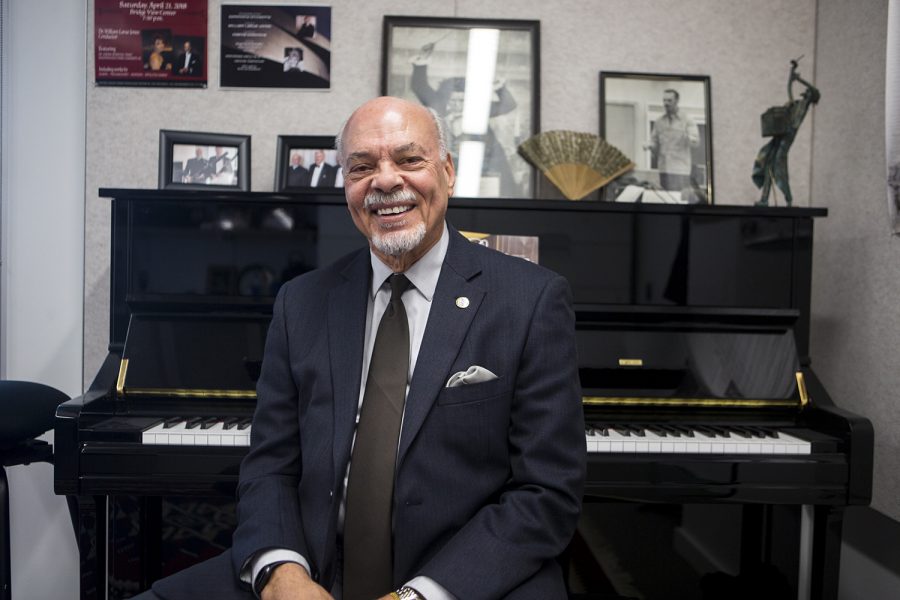UI’s orchestra and opera director will retire at semester’s end
After 22 years at the UI, the Director of Orchestral Studies William La Rue Jones has announced his plans to retire.
UI orchestra director, Dr. William LaRue Jones, poses for a portrait in his office at Voxman Music Building in Iowa City on Tuesday, February 5, 2019. Dr. Jones is retiring after teaching at the University for over two decades.
February 10, 2019
Every day, there are rehearsals. The symphony practices on Mondays, Wednesdays, and Fridays. The opera meets Tuesday evenings and through the end of the week. The chamber orchestra meets Tuesdays and Thursdays, parallel to the graduate conducting class.
Twenty-two years after his arrival at the UI, Director of Orchestral Studies William LaRue Jones has announced plans to retire at the semester’s end — which, he said, will leave him with an unprecedented amount of free time compared to his rigid rehearsal routine.
“I think I’m going to miss the constant contact with students,” Jones said. “It’s sort of hard to say, because I enjoyed all of it.”
As a college freshman, Jones initially enrolled in electrical engineering. He discovered early on he wasn’t interested and joined the band based on the mild skills he had learned by playing clarinet in high school.
“I really didn’t play an instrument; I’d never taken a lesson,” Jones said. “The band director encouraged me to start taking some courses, so I continued on for a master’s, went to New York, and studied at Juilliard.”
Jones came to the UI in 1997 after founding the Greater Twin Cities’ Youth Symphonies, conducting the Bloomington Symphony, and playing bassoon in the Minnesota Orchestra. Now, he conducts the Ottumwa Symphony Orchestra and is the national president of the American String Teachers Association.
He said he and his wife, who also works in the Voxman Music Building, are content living in Iowa City and plan to remain following their mutual retirement. In addition, they can now travel together to Asia, where he conducts various professional orchestras.
“Working with the students in the orchestra is always fun,” Jones said of his UI Symphony students. “It always changes because they graduate, so there’s always something new and fresh.”
RELATED: UI Symphony Orchestra starts off with first concert of the season
Furthermore, he said, teaching graduate students to conduct was a great opportunity to watch them develop and establish their careers. Jones said the conducting program has a 100 percent job-placement rate.
Undergraduate Dana Mietus said Jones has a knack for recommending students and furthering their careers. As a professor, Mietus said, she liked Jones always telling students the background of their pieces, the composers, and what changes it brought about.
“His way of rehearsing especially covers all aspects of the music,” Mietus said. “A lot of times, that doesn’t happen. You get the piece, and that’s been my favorite part.”
Mietus said Jones probably has the most students to conduct besides the Marching Band, and yet he still manages to get to know each of them and care about them, or at least put forth the effort.
“He knows that us being supportive of each other is what’s going to make us better musicians and people,” Mietus said. “Both as a viola performance player and music-education student, he’s known my name since I was a freshman.”
At the beginning of the semester, Mietus said, Jones told his students how much he admires the UI and the relationships the instrument players have with one another. A different environment could be a toxic one.
In the words of UI graduate student Fernanda Lastra, Jones is like a father for everyone in Orchestra and Opera Departments, probably because he sees them every day and always asks how they are.
“He’s not like a cold conductor,” Lastra said. “He’s engaging with the students, so I think they will miss that.”
She chose the UI because a friend spoke so highly of Jones as a professor and conductor, she said.
“He’s great, he has a lot of experience,” Lastra said. “He’s very generous in that he will not keep that knowledge for himself.”






